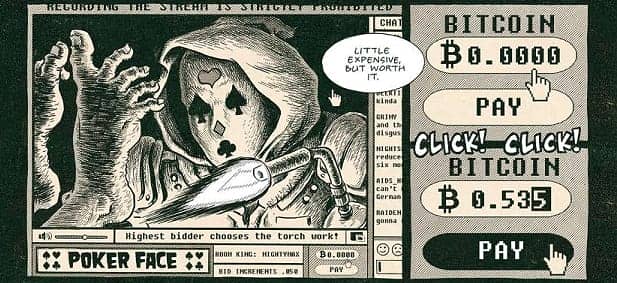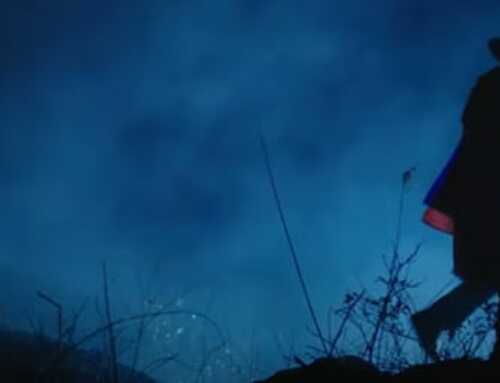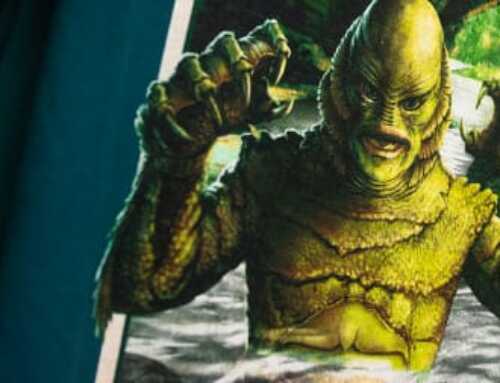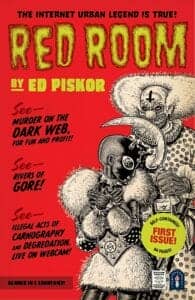 We’re back with another interview, this time with Eisner Award-winning cartoonist Ed Piskor ahead of the May 19th release of Red Room #1! Piskor’s Red Room series is a connected anthology based on the horrors of the dark web and the sickos who indulge in them. The first issue is a no-holds-barred gorefest and send-up to all things splatterpunk– in other words, this is a can’t miss series for fans of the extreme and off-color. We’re grateful to have had the chance to catch up with Ed and pick his brain about all things Red Room, and as always, keep an eye out for our forthcoming review of the first issue!
We’re back with another interview, this time with Eisner Award-winning cartoonist Ed Piskor ahead of the May 19th release of Red Room #1! Piskor’s Red Room series is a connected anthology based on the horrors of the dark web and the sickos who indulge in them. The first issue is a no-holds-barred gorefest and send-up to all things splatterpunk– in other words, this is a can’t miss series for fans of the extreme and off-color. We’re grateful to have had the chance to catch up with Ed and pick his brain about all things Red Room, and as always, keep an eye out for our forthcoming review of the first issue!HorrorBuzz: There are mentions of deep fakes and plenty of bitcoin being thrown around in Red Room, are there other emergent technologies you plan to incorporate into the book? As a follow-up, are there any which particularly inspire or scare you?
Ed Piskor: Yes there are. Some I can only show and shouldn’t tell because they’re some obscure things that only people seeking them out would/should know. I’m trying to think if there are some in here that are more popular. Yes, though, I keep up with technology and whenever there’s something out there that can help Red Roomers evade capture it’ll be added to their process of operational security. The whole dark web economy scares me. It’s the whole point of doing the book. I read all the articles, human trafficking, exploitation material, hitmen, gun-running, drug markets, bitcoin laundering. It really sounds like a wild west happening under the surface and it allows my imagination to conjure up lots of horrific possibilities.
HB: As for 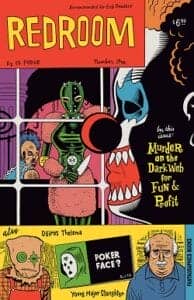 the format of Red Room— you’ve stated that this is an anthology, but will each story actually involve red rooms, and are they part of a shared universe? I hope so, because it’d be kind of a shame to see all the effort put into worldbuilding in issue 1 not carry forward into further installments
the format of Red Room— you’ve stated that this is an anthology, but will each story actually involve red rooms, and are they part of a shared universe? I hope so, because it’d be kind of a shame to see all the effort put into worldbuilding in issue 1 not carry forward into further installments
 the format of Red Room— you’ve stated that this is an anthology, but will each story actually involve red rooms, and are they part of a shared universe? I hope so, because it’d be kind of a shame to see all the effort put into worldbuilding in issue 1 not carry forward into further installments
the format of Red Room— you’ve stated that this is an anthology, but will each story actually involve red rooms, and are they part of a shared universe? I hope so, because it’d be kind of a shame to see all the effort put into worldbuilding in issue 1 not carry forward into further installmentsEd: Yes, every issue of RED ROOM stands on its own as a complete unit rather than the standard operating procedure of doling 1 idea out across 6 issues of a comic series like people are used to with the mainstream. The universe does connect to every story and I was going to knee-jerk say that they all involve Red Rooms but this issue I’m working on now actually deals with a psychotic couple who are inspired by Red Rooms. More to your point, this is a world-building exercise so the rules that I establish and reveal along the way will be respected and followed slavishly as I put together subsequent stories.
HB: Speaking of, the worldbuilding in issue 1 of Red Room is really well developed and deeper than one might expect based on premise alone– how much, if any, of that worldbuilding is inspired by true events?
Ed: A fair share, to be sure. The main guy is my fictional BTK serial killer, kinda. I’m always astounded whenever these suburban dads are revealed to be monsters and the family is none the wiser. Ross Ulbricht, the creator of the dark web market, The Silk Road, is someone I’ve studied endlessly. Basically, anybody who’s been captured from their activities on the dark web, I’ve read their police reports, indictments, court cases, etc. Just to get a sense of the person, the technology involved, it’s never revealed how these people are captured, etc.
It’s hard for me to ever come up with a good motivation for making a character kill someone because it becomes redundant thinking about them doing it for the money all the time, so I’ve been studying odd stuff like CTE and how that affects impulse control, risky behaviour, and adrenaline bursts.
HB: Can 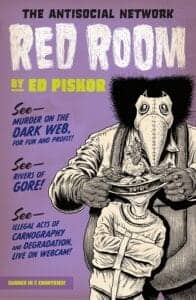 you tell us a bit about your horror inspirations for the series? If I had to guess I’m feeling Eli Roth and the early wave of shock cinema, as you reference Cannibal Holocaust early on.
you tell us a bit about your horror inspirations for the series? If I had to guess I’m feeling Eli Roth and the early wave of shock cinema, as you reference Cannibal Holocaust early on.
 you tell us a bit about your horror inspirations for the series? If I had to guess I’m feeling Eli Roth and the early wave of shock cinema, as you reference Cannibal Holocaust early on.
you tell us a bit about your horror inspirations for the series? If I had to guess I’m feeling Eli Roth and the early wave of shock cinema, as you reference Cannibal Holocaust early on.Ed: Sure, I’ve not seen any of the Hostel movies or other Eli Roth stuff, but I do come from the VHS rental store. I’m very self-aware of what this comic is and I am indulging in doing the opposite of my creative brethren. While they pander and chase the little girl market, I’ll do something hardcore. While my brethren have to make their “ultimate statement” graphic novels, I’ll do a goofy pulp comic with very little redeeming value other than it’s just simply cool as fuck to me. Mortal Kombat factors in. Splatterpunk and horror paperback novels by guys like Jack Ketchum, Rex Miller, Clive Barker, and Rich Laymon are also part of the soup. Aesthetically, you don’t have to look any further than Faust, The Crow, Bill The Clown, Dead World, and the basic catalog of Northstar comics and super early Caliber press comics, with a dash of Mirage studios mixed in there.
HB: Are you a fan of clipping? Between their track The Show and your background in Hip Hop and music culture, it seems like a natural fit. Were there other musical influences for Red Room that readers may be interested in checking out?
Ed: I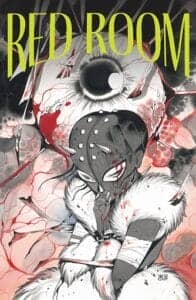 don’t know clipping. I do have soundtracks in mind though, and it would be the 90’s industrial stuff. Put on the Crow soundtrack, some Nine Inch Nails, Nurse with Wound, Tool! That kinda shit.
don’t know clipping. I do have soundtracks in mind though, and it would be the 90’s industrial stuff. Put on the Crow soundtrack, some Nine Inch Nails, Nurse with Wound, Tool! That kinda shit.
 don’t know clipping. I do have soundtracks in mind though, and it would be the 90’s industrial stuff. Put on the Crow soundtrack, some Nine Inch Nails, Nurse with Wound, Tool! That kinda shit.
don’t know clipping. I do have soundtracks in mind though, and it would be the 90’s industrial stuff. Put on the Crow soundtrack, some Nine Inch Nails, Nurse with Wound, Tool! That kinda shit.HB: The art of Red Room is a perfect reflection of the subject matter– even mundane scenes have a grimy and off-putting look. Were there any visual inspirations for that aesthetic, or is the art of red room purely the culmination of the concept in your head?
Ed: I mentioned most of the direct influences on the art above but I can get into some detail about what they share. I like duotone and zipatone and lots of black ink and spattering media with a toothbrush. Urban decay. Scumbags. We use the term “outlaw comics” for that era of comic books and they share these tropes. Heavy rendering. Not much negative space on the page. Lots of stuff that would make parents wince.
HB: Why is there always a dick guy in here?
Ed: Hahahaha. Writing the Red Room chat room windows is some of my favorite stuff and every now and then when they’re discussing the atrocities on screen someone might make an off-color joke and the rest of the chatroom turns on them and gets liberal on their asses, which I think is kind of hysterical, given the imagery that’s often on the screen. The “Dick guys” represent the people who take things too far, even by the standards of scoundrels and sick fuckers they’re associating with.


